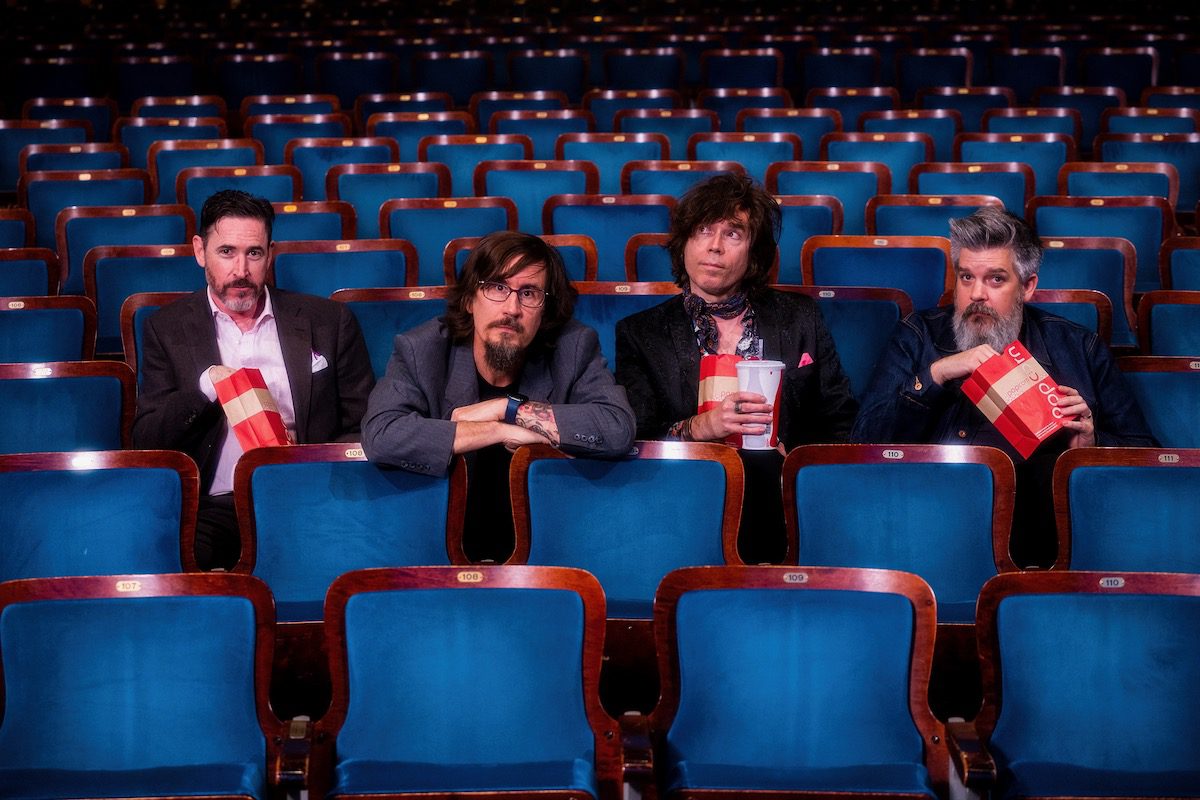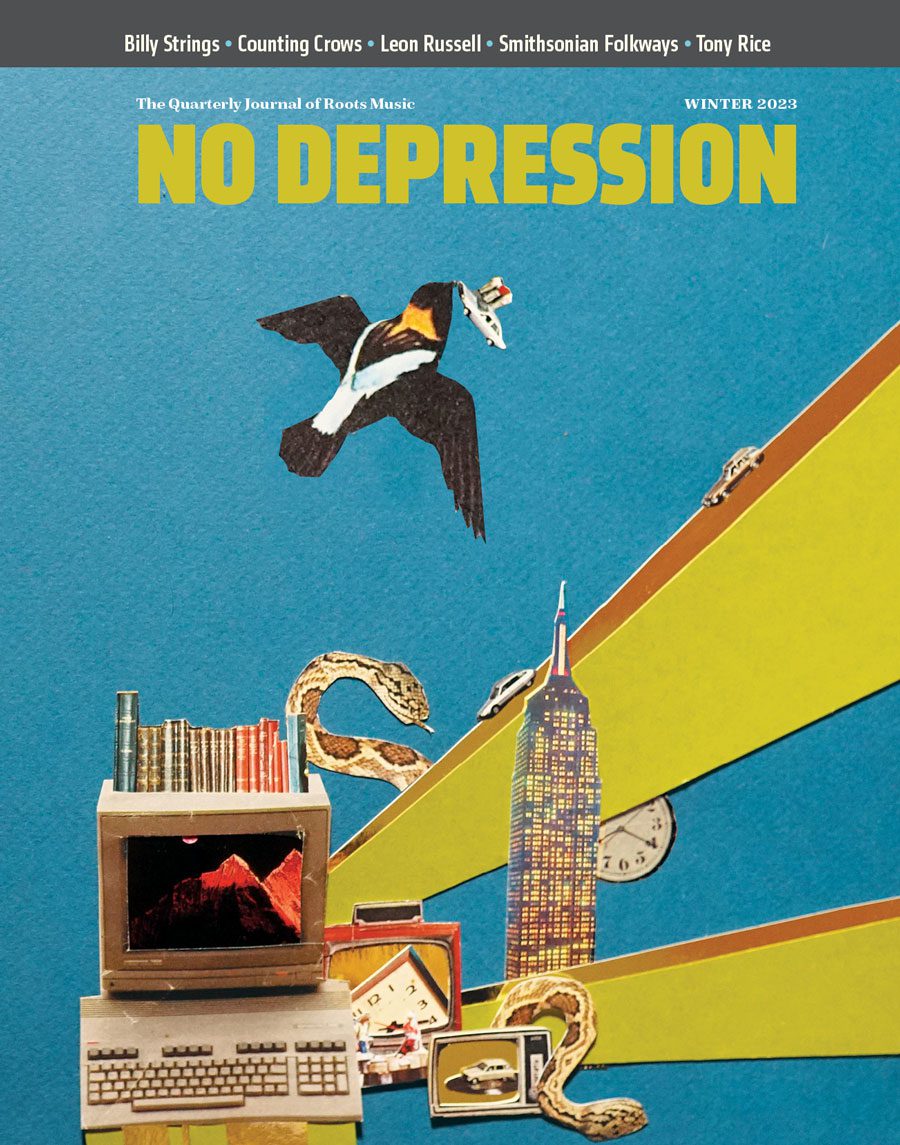In the Deep End With … The Mountain Goats’ John Darnielle

The Mountain Goats (photo by Spence Kelly)
We all sought some comfort during the lonely, scary days of pandemic lockdowns. For some it came in the form of sourdough bread, puzzles, or Tiger King. For Mountain Goats leader John Darnielle, it was action movies.
The fast-paced films were a soundtrack to his earliest songwriting days, a source of snippets of inspiration, and he rediscovered them during his extended time at home in Durham, North Carolina, in the pandemic’s first months. The formulas and the fury became the seeds of songs inhabited by desperate characters and plenty of plot on Bleed Out, The Mountain Goats’ 20th studio album, released Aug. 19 via Merge Records.

For our “In the Deep End With …” series, we asked Darnielle about his work habits, his love of action movies, and his feelings on vengeance. That phone conversation, lightly edited for length and clarity, follows. In keeping with the series’ theme, the questions start at a purr but rev up to something deeper.
Bleed Out is the 20th album from The Mountain Goats. What fuels that level of output? Do you set out to release an album every year or two no matter what, or is that just kind of what happens?
No, I just work. I just do stuff, and it comes together. As songwriters it’s not asking that much to write maybe a song a month, because that’s your job, right? It doesn’t feel like that much to ask of a person to write a song a month, which would make about an album a year. So, yeah, I’m always working. I mean, that’s what I’m supposed to be doing. I also write books, I’m plenty busy, but I don’t sit around waiting for lightning to strike me in the head. I sit down and I come up with ideas and write stuff. It’s not magic, it’s carpentry.
The songs of Bleed Out were inspired by watching action movies, which isn’t a new source of inspiration, but one you’ve described as going back to recently. Where does your love for action movies come from?
When I was young, I was kind of a snob, and everybody would be seeing all these action movies and I would only watch foreign movies or whatever. And I still like all that stuff, but like everything else in my life, if I go through a period of going, “Oh, well, you know, I’m not into that,” then later I want to look at it. At some point in the ’80s, I stopped by a Vietnamese restaurant that had a big widescreen TV, and they were showing Rocky III, which I had totally turned my nose up at when it was in theaters. When I was done eating I got up to leave, to pay, and they said, “Wait, did you want to watch the movie?” I was like, “Okay, well, I’m 19, I’ve got nothing better to do today.” So I sat down and watched, and I was like, “Oh, you know what? This is actually kind of good.” This is the age of VHS, so I got into renting stuff to sit and watch, and it just broadened my palette.
Is there a certain genre of action movie that you like, or a certain time period?
I love kung fu movies, which are their own sort of subgenre. I like things with a little bit of a cult thing. There was a movie in the ’80s called I Come in Peace, it’s technically an action movie, but it also has — just like Predator does or The Running Man — a science fiction or slightly cult angle to it. And that’s kind of what I like.
Do you have an all-time favorite action movie?
I like Lionheart with [Jean-Claude] Van Damme a lot, which is not a great movie. But I’m quite fond of it, because Van Damme movies are kind of their own thing. They’re very formulaic. They’re basically martial arts movies, but they’re coming from sort of an ’80s action movie tradition. And the bad guys have this evil-for-the-sake-of-evil vibe. Some people are evil because they want money, some people are evil because they want power. But then there’s a type of villain for whom evil is its own reward, who just wants to do harm. Those are the scary guys, but they’re also the ridiculous guys. There’s very few people really like that in the universe.
How did these action movies inspire the songs? Can you give an example of a specific movie that led to a specific song on Bleed Out?
During the pandemic, everybody kept posting all the time about how they’re binge watching this or binge watching that. I have two children and one of them doesn’t sleep well, so binge watching anything after the kids go to bed is not a thing for us. So I hadn’t watched anything, but one evening in October of 2020 I said, “I should watch something.” I started trying to watch my Blu-rays. I have a bunch of good silent movies, I have a bunch of great foreign movies. But if your problem is that the kids have gone to bed and you only have a short amount of time to sleep, then the highfalutin stuff that I really enjoy, I just don’t have the mental energy for it. I need something that’s got adrenaline in it. And so I went, “Well, I’ll watch some action movies.”
I wound up watching a movie called Mesrine, about a French gangster who kept breaking out of jails. There’s finally a sting to get him, all the cops have coordinated something to catch him and they’re in plain clothes in his neighborhood. It’s this moment where nobody on any corner or in any coffee shop is who they look like. They’re all actually cops. And in that moment, I said, “Oh, there’s guys on every corner here. Oh, that’s nice line.” I thought, what if I gave the guys to the bad guys instead of to the cops? So that’s what the song “Guys on Every Corner” is.
In addition to Bleed Out, you also released a new novel, Devil House, this year. Do you see any parallels between writing a novel and writing a song? Or do they use a completely different part of your brain?
They are different parts of the brain. When I’m in book world, I try and shut everything else out, because writing books takes a lot of attention, it takes careful attention. I can write a song very quickly, and I do. I can be watching a movie and pull in some ideas, hit pause, write a verse and a chorus, and hit play again. When “Training Montage” got written, that’s exactly what happened. I forget which movie I was watching, but it was watching something that day and saw, oh, there’s a training montage coming up. I was like, “It’s all the same stuff. You could just list all the tropes in a training montage. And that could be your song.”
Vengeance is a big theme on Bleed Out. Why is that something you wanted to explore?
The source material sort of points you in that direction. Most action movies are rooted in some trope of somebody getting even about something. And as soon as I would start thinking about that, then it thrust me back to my college days because Greek tragedy — which was my big thing as an undergrad — it’s all about the utility of repayment; if you are trying to pay somebody back for a wrong they did you, you always and invariably overpay, you always do too much. Now they owe you one. It’s this never-ending chain. And that’s a very biblical story. So it’s both Greek and biblical: Well, now I’m in my comfort zone.
It’s why in practically every civilized society we outlaw the death penalty, because it doesn’t make sense, it doesn’t give satisfaction to the living. But at the same time, you or I can both imagine someone coming for our children and saying, “Well, I’ll kill them with my bare hands. I’ll strangle them to death. I will watch the life go out of them and it will be a satisfying feeling.” It’s primal and basic, like many of our urges.
That’s the charm as a writer of primal urges, you let them out to play. They have all places and alleys they want to run into, they’re excited to be out in the light. … It’s fun in the space of art to let some of that stuff out to breathe a little.





